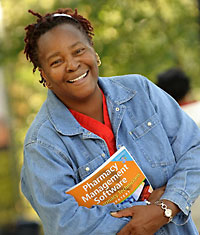Brain and Spine Surgery: Carol's Story
'I Didn't Think I'd Live to See 57'
That she is still alive today surprises Carol Adams and fills her with gratitude. "I lived to see my 57th birthday, thanks to the skilled hands of my doctor," the Clinton resident says. "I wouldn't trade him for anything in the world."
It is extremely uncommon for a young patient to have two very complicated and extensive surgeries in the course of four months. But that is exactly what happened to Carol, explains Amin Amini, MD, medical director, Neurosurgery, Holy Cross Hospital.
An Accurate Diagnosis
Carol's ordeal began in September 2009, when she woke up one day feeling awful. "I couldn't even get my head off the pillow," she recalls.
She went to Holy Cross Hospital's Emergency Center, where staff immediately performed a magnetic resonance imaging (MRI) scan. MRI uses magnetic waves to provide detailed images of the body and is especially useful for seeing inside the brain.
The MRI revealed that a tumor in Carol's brain was compressing important structures, including the areas that control breathing and heart rate as well as nerves that control hearing and facial movement. The tumor had been growing for years. That explained her symptoms - headaches, nausea and dizziness.
In the Emergency Center, Carol had 24-hour access to Holy Cross Hospital's neurology and neurosurgery specialists - as do all of our patients. "This allows us to respond to these types of emergencies without patients having to travel for care," Dr. Amini explains.
Brain Surgery
Right away, Dr. Amini - an expert in treating complex conditions of the brain and spine - and his team went to work carefully planning every detail of Carol's brain surgery. They spent hours
determining the best approach to removing the tumor while also preserving the many important structures around it.
To enter the lower compartment of her brain, Dr. Amini opened Carol's skull behind her ear. While closely monitoring her cranial nerves and brainstem functions, Dr. Amini used a microsurgical technique to delicately peel the tumor off the important structures of Carol's brain.
During the five-hour surgery, which was performed under a microscope, the entire mass was removed and all of Carol's neurological functions were preserved. "I felt better immediately," Carol says. "I woke up, ate breakfast and walked down the hall with my physical therapist."
More Troubles Ahead
During Carol's initial medical evaluation before her brain surgery, Dr. Amini also discovered a severe narrowing of the spinal canal in her neck, a condition called cervical spinal stenosis. The condition was causing Carol to experience neck pain, numbness in her fingers and weakness in her legs.
"The severity of her spinal condition predisposed her to spinal cord injury and possible paralysis," Dr. Amini explains. "Knowing that, we had to be very careful while removing her brain tumor not to aggravate the stenosis."
Spinal Surgery
Four months after her brain surgery, Dr. Amini and Carol decided it was time to treat her spinal condition. Dr. Amini opened the spinal canal by removing a portion of bone and ligaments to make more room for the spinal cord. Then he placed small screws into the vertebrae to preserve the stability of Carol's spine.
"During this three-hour surgery, we continuously monitored spinal cord function to prevent any spinal cord injury during the procedure itself and while preparing for the procedure," Dr. Amini says.
With these big surgeries behind her, Carol is taking advantage of her new lease on life. She's going to school to become a pharmacy technician. "I love school and look forward to starting my new career," she says.
Advanced Neurological Care Close To Home
The neuroscience program at Holy Cross Hospital offers expertise in the screening, diagnosis and treatment of complex brain and spine disorders. Our services include:
- Neurosurgery for a wide range of brain and spine disorders.
- Advanced neuromonitoring in our Epilepsy Monitoring Unit under the medical leadership of an epileptologist to evaluate seizure disorders in adults.
- Exceptional neuro-oncology care using sophisticated medical and surgical treatments
- A Neuro Critical Care Unit to support patients who have had neurosurgery or who have life-threatening neurological conditions.
Holy Cross Hospital treats more stroke patients than any other hospital in Montgomery County. It has been designated an advanced Primary Stroke Center by the Joint Commission and the Maryland Institute for Emergency Medical Services Systems.
